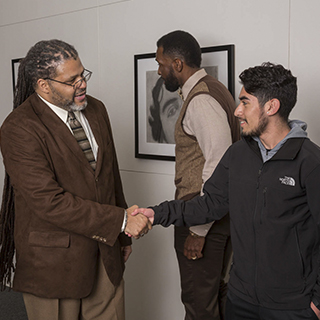Mentoring Programs Guide Better Futures
Kenny Snell moved from couch to couch. When those welcomes ended, he moved from shelter to shelter. He did not know what to do after losing his job and then his home. And without a home, he could not see his son.
But he continued to attend classes at Tarrant County College.
And because he involved himself in the Men of Color Mentoring program and gained a mentor, he found his way to a brighter future.
“I would have never known to go to the financial aid office without my mentor,” he said. “It got me a place to live, something to eat and in school. I'd still be homeless without my mentor.”
TCC's Men of Color, Empowering Links and Chancellor's Emerging Leaders strive to help students successfully find their way through higher education. Mentors provide guiding hands and listening ears to students who might otherwise become lost and, worse yet, give up.
First-generation students often lack the support they need for navigating the complexities of college life, according to Anthony Walker, director of student success and completion, who oversees Men of Color. Through mentors, they find that support and a sense of belonging on campus.
“The mentor plays a bridge to that,” Walker said. “If they don't know how to navigate a system or who to ask a question, those are the students we’re going to lose.”
More than one in three young people never had an adult mentor of any kind while growing up, according to the 2014 National Mentoring Partnership report. At-risk youth without mentors are less likely to enroll in or graduate from college. Forty-five percent of at-risk youth with mentors enrolled in post-secondary education while only 29 percent of at-risk youth without mentors enrolled in college.
 Men of Color began at the Trinity River Campus in 2011 after an administrator noticed
only half of the African-American and Latino males that enrolled in the fall returned
for the spring semester. The program supports college completion through connecting
participants with encouraging faculty, staff, administrators and community leaders.
Students meet weekly with mentors, who provide academic and personal support. The
program also teaches them how to handle their finances and budget their money.
Men of Color began at the Trinity River Campus in 2011 after an administrator noticed
only half of the African-American and Latino males that enrolled in the fall returned
for the spring semester. The program supports college completion through connecting
participants with encouraging faculty, staff, administrators and community leaders.
Students meet weekly with mentors, who provide academic and personal support. The
program also teaches them how to handle their finances and budget their money.
In 2012, the program spread throughout the TCC District with 89 students the first year. In the fall of 2015, they worked with 236 students. About 450 students have gone through its program.
The academic support received has generated strong results. Students have moved from GPAs of 0 to 2.8 in a semester.
Walker has seen students gain confidence to pursue further education beyond an associate degree. Some are even pursuing graduate degrees.
“Their sense of what could be has expanded beyond belief,” he said. “They are imagining the possibilities. They are growing as leaders. They are getting involved.”
Chancellor's Emerging Leaders began in 2013 when the late Chancellor Erma Johnson Hadley decided to provide students in developmental education courses with support. For students who do not meet college readiness standards in reading, writing and math, the program builds academic skills as well as leadership qualities to help students become successful in college and in their careers. It connects students to mentors and provides opportunities for students to shadow professionals for hands-on experiences. The 2014-15 class of 40 students completed with a 79 percent course success rate. Comparatively, the rest of the college population finished with a 66.4 percent success rate.
Empowering Links came to TCC in the fall of 2013 as part of Equation for Excellence, a nationwide mentoring program that supports student success. The mentoring program empowers female students to make lasting connections and to define personal and career goals. About 40 students have enrolled in the program for the 2015-16 school year.
“The mentors ease the transition from high school to college,” said Robin Birt, director of strategic initiatives, who oversees Chancellor's Emerging Leaders and Empowering Links.
“Mentors act like a guide for college. Once the students get acclimated to campus, then they grow and blossom.”
Robin Birt
Jamitra Williams found support and encouragement through her Empowering Links mentor. Whenever she has questions about a program or school or in life, she knows she can find help from her mentor.
“My mentor is encouraging and someone I look up to. I want to be like her and empower others. She can help me find the answers or the right person to help. She's also a listening ear.”
Jamitra Williams
Williams received a scholarship and the opportunity to travel to Austria as part of a global citizenship program through Empowering Links. She has also found herself changed.
“Before I looked at life as ‘How are you doing?’ Now, it's ‘How are you doing? Do you need any help?’” she said. “Because I've received help, I want to help other people.”
That is something Snell understands. He joined Men of Color because he thought it would help him graduate, but it ended up doing much more.
“I'm 27, but sometimes I feel like a kid and I don't know what to do,” he said. Through the group, he learned, “Real men ask questions.”
In his mentors he found people he could turn to with his questions and who would help him find answers.
Snell looks forward to a future career as an educator and a coach, mentoring others. And he looks forward to being there every day to guide his son as he grows.
“It's good to have someone having your back,” he said.


![//parameter[@name='author']](/magazine/assets/images/authors/jennifer-sicking.jpg)